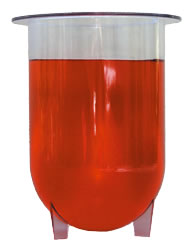Plastic Vessels

Plastic Vessel
Plastic vessels can be used in place of glass where appropriate. The plastic must not interfere with the analysis by sorbing, leaching or reacting with the analyte. Typically styrene acrylonitrile is used. Plastic vessels have the advantage over glass in that they are very reproducible — the vessel is made from a mould rather than hand-formed. This reduces possible errors in setting the paddle height and centering and can give very reproducible results.
However there are a number of problems with using plastic vessels, the most important being its poor thermal conductivity. This means it is often necessary to have the temperature of the water bath 2°C higher than the analysis temperature and this also leads to extended equilibration times. Another major drawback using plastic vessels is their lack of resistance to scratching which means they have to be replaced more often.
